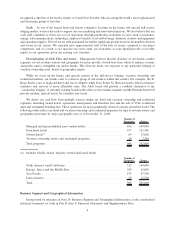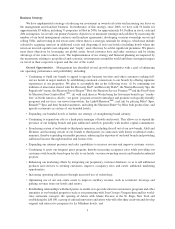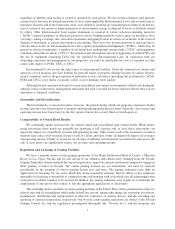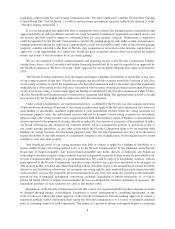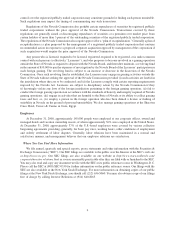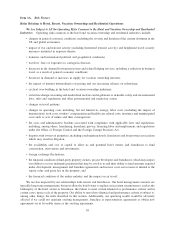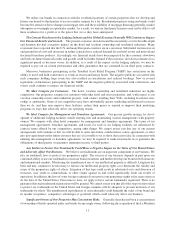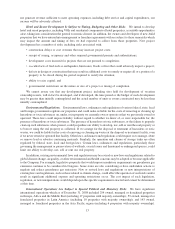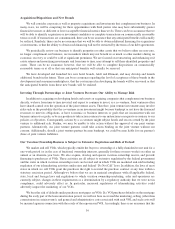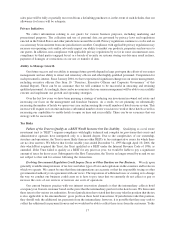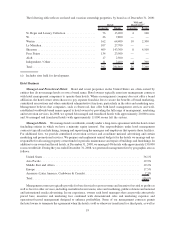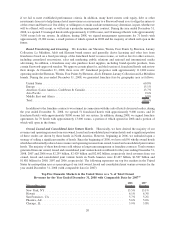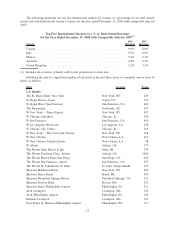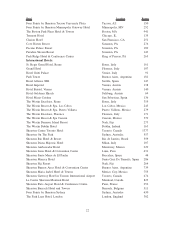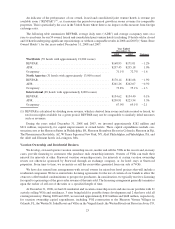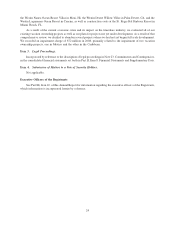Starwood 2008 Annual Report Download - page 80
Download and view the complete annual report
Please find page 80 of the 2008 Starwood annual report below. You can navigate through the pages in the report by either clicking on the pages listed below, or by using the keyword search tool below to find specific information within the annual report.International operations generally are subject to various political, geopolitical, and other risks that are not present in
U.S. operations. These risks include the risk of war, terrorism, civil unrest, expropriation and nationalization as well
as the impact in cases in which there are inconsistencies between U.S. law and the laws of an international
jurisdiction. In addition, some international jurisdictions restrict the repatriation of non-U.S. earnings. Various other
international jurisdictions have laws limiting the ability of non-U.S. entities to pay dividends and remit earnings to
affiliated companies unless specified conditions have been met. In addition, sales in international jurisdictions
typically are made in local currencies, which subject us to risks associated with currency fluctuations. Currency
devaluations and unfavorable changes in international monetary and tax policies could have a material adverse
effect on our profitability and financing plans, as could other changes in the international regulatory climate and
international economic conditions. Other than Italy, where our risks are heightened due to the 6 properties we
owned as of December 31, 2008, our international properties are geographically diversified and are not concentrated
in any particular region.
Risks Relating to Operations in Syria
During fiscal 2008, Starwood subsidiaries generated approximately $4 million of revenue from management
and other fees from hotels located in Syria, a country that the United States has identified as a state sponsor of
terrorism. This amount constitutes significantly less than 1% of our worldwide annual revenues. The United States
does not prohibit U.S. investments in, or the exportation of services to, Syria, and our activities in that country are in
full compliance with U.S. and local law. However, the United States has imposed limited sanctions as a result of
Syria’s support for terrorist groups and its interference with Lebanon’s sovereignty, including a prohibition on the
exportation of U.S.-origin goods to Syria and the operation of government-owned Syrian air carriers in the United
States except in limited circumstances. The United States may impose further sanctions against Syria at any time for
foreign policy reasons. If so, our activities in Syria may be adversely affected, depending on the nature of any
further sanctions that might be imposed. In addition, our activities in Syria may reduce demand for our stock among
certain investors.
Debt Financing
As a result of our debt obligations, we are subject to: (i) the risk that cash flow from operations will be
insufficient to meet required payments of principal and interest, (ii) restrictive covenants, including covenants
relating to certain financial ratios and (iii) interest rate risk. Although we anticipate that we will be able to repay or
refinance our existing indebtedness and any other indebtedness when it matures, there can be no assurance that we
will be able to do so or that the terms of such refinancings will be favorable. Our leverage may have important
consequences including the following: (i) our ability to obtain additional financing for acquisitions, working
capital, capital expenditures or other purposes, if necessary, may be impaired or such financing may not be available
on terms favorable to us and (ii) a substantial decrease in operating cash flow, EBITDA (as defined in our credit
agreements) or a substantial increase in our expenses could make it difficult for us to meet our debt service
requirements and restrictive covenants and force us to sell assets and/or modify our operations.
In order to fund new hotel investments, as well as refurbish and improve existing hotels, both we and current
and potential hotel owners must have access to capital. The availability of funds for new investments and
maintenance of existing hotels depends in large measure on capital markets and liquidity factors over which
we have little control. Recent events have made the capital markets increasingly volatile. As a result, many current
and prospective hotel owners are finding hotel financing to be increasingly expensive and difficult to obtain. Delays,
increased costs and other impediments to restructuring such projects may affect our ability to realize fees, recover
loans and guarantee advances, or realize equity investments from such projects. Our ability to recover loans and
guarantee advances from hotel operations or from owners through the proceeds of hotel sales, refinancing of debt or
otherwise may also affect our ability to raise new capital. In addition, downgrades of our public debt ratings by
rating agencies could increase our cost of capital. A breach of a covenant could result in an event of default, that, if
not cured or waived, could result in an acceleration of all or a substantial portion of our debt. For a more detailed
description of the covenants imposed by our credit agreements, see Item 7, Management’s Discussion and Analysis
of Financial Condition and Results of Operations — Liquidity and Capital Resources — Cash Used for Financing
Activities in this Annual Report.
14


